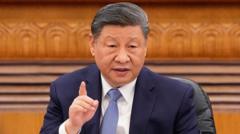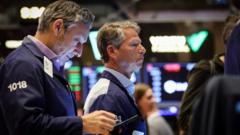**As Europe grapples with Donald Trump's proposed tariffs, leaders are readying countermeasures while hoping for negotiations to avert a full-scale trade conflict.**
**Europe Eyes Trump Tariffs Negotiation Amidst Trade War Preparations**

**Europe Eyes Trump Tariffs Negotiation Amidst Trade War Preparations**
**EU Leaders Assemble to Counteract Potential Economic Impact of US Tariffs**
In light of the recent announcement by US President Donald Trump regarding a sweeping 20% tariff on imports from Europe, EU leaders have rapidly mobilized to prepare for the worst while seeking pathways for negotiation. Economic leaders across the continent were taken by surprise, with French Prime Minister François Bayrou labeling the decision a “catastrophe for the economic world.” Ursula von der Leyen, President of the European Commission, echoed this sentiment during her visit to Central Asia, warning of dire consequences for millions globally.
The EU is leading discussions on how to respond effectively on behalf of its 27 member states. EU Trade Commissioner Maros Sefcovic has stated intentions to engage in talks with US counterparts, emphasizing a "calibrated" response that allows ample time for negotiations. Italian Prime Minister Giorgia Meloni has convened emergency meetings to discuss immediate impacts, particularly on Italy’s thriving agribusiness sector, which is heavily reliant on US exports.
While Spain's Prime Minister Pedro Sánchez attempted to clarify misconceptions about EU tariff rates, he expressed desolation over the looming trade war, asserting that such protectionism would ultimately harm the aggressor more. Concerns run high as industries brace for significant economic repercussions; the Spanish Chamber of Commerce is already predicting substantial declines in exports.
The sectors poised for the hardest hits include French and Italian wines, where stakeholders face potential losses in market share from US consumers turning to imitations. Reports suggest that a significant portion of sales relies on the US market, leaving industry leaders in a precarious state of uncertainty, hoping that diplomatic solutions will emerge.
As Europe reacts, financial markets have begun to reflect anxiety, with stocks like Adidas seeing significant losses. Both small and large enterprises alike are preparing for fallout as the trade landscape shifts. Leaders like Germany's acting Chancellor Olaf Scholz assert that Europe's vast consumer market presents a counterbalance to US tariffs. However, uncertainty looms, especially for smaller exporting businesses, as they navigate the complexities of this unfolding trade dispute.
The EU has already earmarked an initial package of counter-tariffs worth €26 billion in response to prior tariffs on steel and aluminium, with discussions underway for a broader set of measures. Should the situation escalate, potential tariffs could extend to US digital services, signaling that the EU possesses considerable leverage amid tensions. Questions remain about whether the bloc can maintain unity while laying out strong retaliatory measures or seek further negotiations to prevent an all-out trade war from derailing economic stability on both sides of the Atlantic.
The EU is leading discussions on how to respond effectively on behalf of its 27 member states. EU Trade Commissioner Maros Sefcovic has stated intentions to engage in talks with US counterparts, emphasizing a "calibrated" response that allows ample time for negotiations. Italian Prime Minister Giorgia Meloni has convened emergency meetings to discuss immediate impacts, particularly on Italy’s thriving agribusiness sector, which is heavily reliant on US exports.
While Spain's Prime Minister Pedro Sánchez attempted to clarify misconceptions about EU tariff rates, he expressed desolation over the looming trade war, asserting that such protectionism would ultimately harm the aggressor more. Concerns run high as industries brace for significant economic repercussions; the Spanish Chamber of Commerce is already predicting substantial declines in exports.
The sectors poised for the hardest hits include French and Italian wines, where stakeholders face potential losses in market share from US consumers turning to imitations. Reports suggest that a significant portion of sales relies on the US market, leaving industry leaders in a precarious state of uncertainty, hoping that diplomatic solutions will emerge.
As Europe reacts, financial markets have begun to reflect anxiety, with stocks like Adidas seeing significant losses. Both small and large enterprises alike are preparing for fallout as the trade landscape shifts. Leaders like Germany's acting Chancellor Olaf Scholz assert that Europe's vast consumer market presents a counterbalance to US tariffs. However, uncertainty looms, especially for smaller exporting businesses, as they navigate the complexities of this unfolding trade dispute.
The EU has already earmarked an initial package of counter-tariffs worth €26 billion in response to prior tariffs on steel and aluminium, with discussions underway for a broader set of measures. Should the situation escalate, potential tariffs could extend to US digital services, signaling that the EU possesses considerable leverage amid tensions. Questions remain about whether the bloc can maintain unity while laying out strong retaliatory measures or seek further negotiations to prevent an all-out trade war from derailing economic stability on both sides of the Atlantic.






















